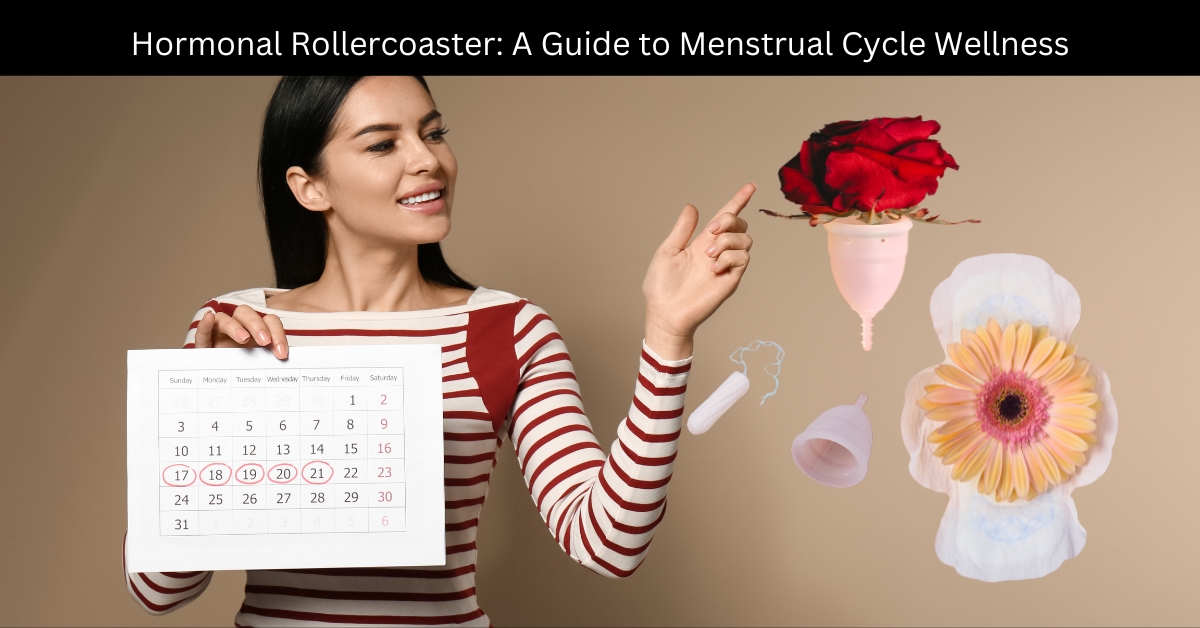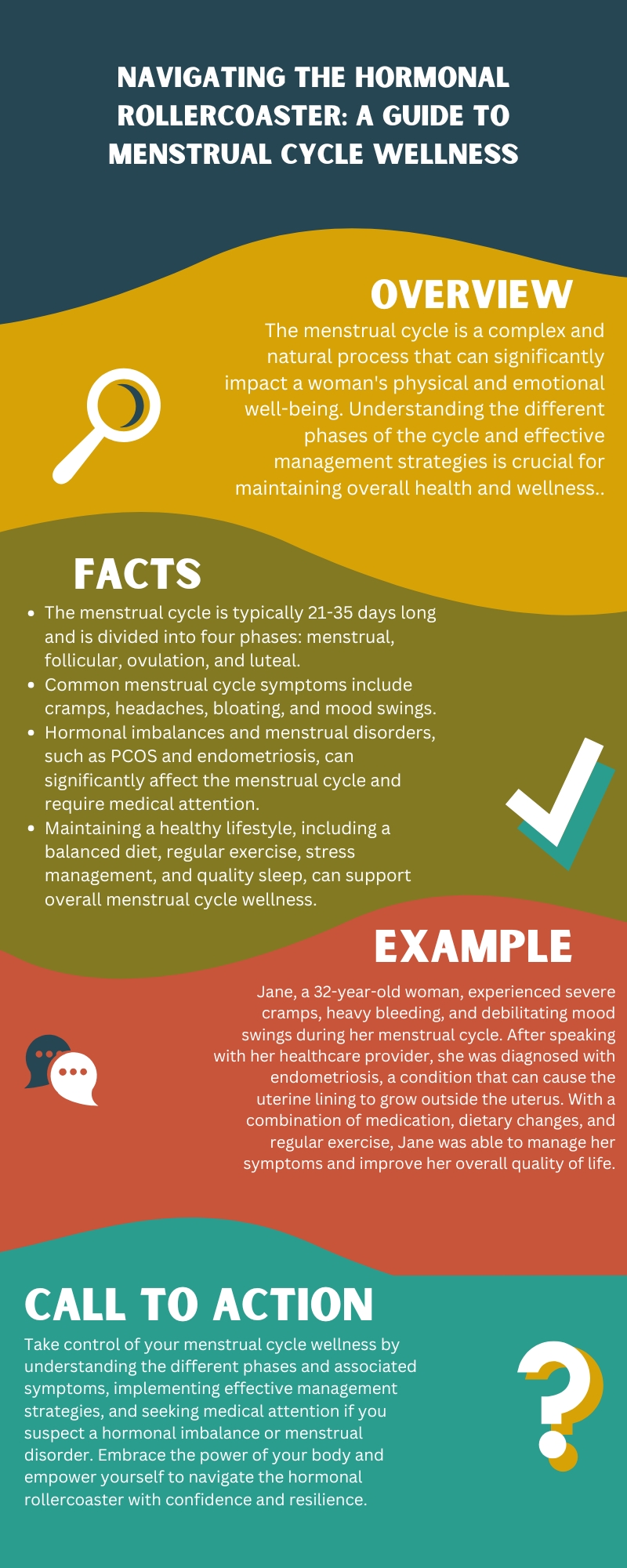The menstrual cycle is a natural and integral part of a woman’s life, yet it is often shrouded in mystery and misconceptions. From mood swings to cramps, the cyclical changes in hormones can have a profound impact on a woman’s physical and emotional well-being.
However, with a deeper understanding of the menstrual cycle and the tools to manage its effects, women can take control of their health and embrace this remarkable biological process.
Key Takeaways:
- The menstrual cycle is a complex and natural process that can significantly impact a woman’s physical and emotional well-being.
- Understanding the different phases of the menstrual cycle and the associated symptoms can help women better manage their health and wellness.
- Effective management strategies for menstrual cycle symptoms include over-the-counter pain relief, lifestyle modifications, and seeking medical intervention when necessary.
- Hormonal imbalances and menstrual disorders, such as PCOS, endometriosis, and PMS, may require specialized medical care and treatment.
- Maintaining a healthy lifestyle, including a balanced diet, regular exercise, stress management, and quality sleep, can support overall menstrual cycle wellness.
- Empowering women through menstrual cycle awareness and breaking down the stigma surrounding menstruation can lead to a more compassionate and inclusive society.

Understanding the Menstrual Cycle
The menstrual cycle is a complex interplay of hormones that occurs within a woman’s body, typically lasting between 21 to 35 days. This cycle is divided into four distinct phases, each with its own unique physiological and emotional characteristics:
- Menstrual Phase: This is the phase when the uterine lining is shed, resulting in the flow of menstrual blood. During this time, women may experience cramps, mood changes, and fatigue.
- Follicular Phase: The follicular phase begins with the start of the menstrual cycle and ends with ovulation. During this time, the body prepares an egg for release, and estrogen levels begin to rise.
- Ovulation: Ovulation is the release of a mature egg from the ovary, which typically occurs around the midpoint of the menstrual cycle. This is the most fertile time of the month.
- Luteal Phase: The luteal phase begins after ovulation and lasts until the next menstrual period. During this time, progesterone levels rise, and the uterine lining begins to thicken in preparation for a possible pregnancy.

Menstrual Cycle Symptoms and Management
Throughout the menstrual cycle, women may experience a variety of physical and emotional symptoms. Understanding these symptoms and learning effective ways to manage them can significantly improve overall well-being.
1. Physical Symptoms
| Symptom | Description | Management Strategies |
|---|---|---|
| Cramps | Painful contractions of the uterus during menstruation | – Over-the-counter pain relievers
– Applying heat to the lower abdomen – Practicing relaxation techniques, such as yoga or meditation |
| Headaches | Tension or migraine-like headaches that may occur during the menstrual cycle | – Over-the-counter pain relievers
– Staying hydrated – Practicing stress-management techniques |
| Bloating | A feeling of fullness or swelling, particularly in the abdomen | – Limiting salt and processed foods
– Incorporating diuretic-rich foods, such as green leafy vegetables and citrus fruits – Engaging in regular exercise |
| Breast Tenderness | Discomfort or sensitivity in the breasts | – Wearing a well-fitted, supportive bra
– Applying a cold compress to the breasts< – Avoiding caffeine and salt |
2. Emotional Symptoms
| Symptom | Description | Management Strategies |
|---|---|---|
| Mood Swings | Sudden changes in mood, ranging from irritability to depression | – Engaging in regular exercise
– Practicing stress-management techniques, such as meditation or deep breathing – Ensuring adequate sleep and a balanced diet |
| Anxiety | Feelings of worry, nervousness, or apprehension | – Incorporating relaxation practices, such as yoga or mindfulness
– Talking to a mental health professional if symptoms persist |
| Fatigue | Feeling drained of energy | – Getting enough sleep
– Engaging in light exercise, such as walking or gentle stretching – Ensuring a balanced diet with plenty of nutrient-dense foods |
Hormonal Imbalances and Menstrual Disorders
While the menstrual cycle is a natural process, some women may experience hormonal imbalances or menstrual disorders that can significantly impact their quality of life. It is essential to be aware of these conditions and seek medical attention if necessary.
1. Polycystic Ovary Syndrome (PCOS)
PCOS is a hormonal disorder characterized by the development of small cysts on the ovaries, leading to an imbalance in the production of reproductive hormones. Symptoms may include irregular periods, excess facial or body hair, acne, and difficulties with weight management.
2. Endometriosis
Endometriosis is a condition in which the tissue that normally lines the inside of the uterus (the endometrium) grows outside the uterus, often on the ovaries, fallopian tubes, or other pelvic organs. This can result in severe pain, heavy bleeding, and fertility issues.
3. Premenstrual Syndrome (PMS)
PMS refers to the physical, emotional, and behavioral symptoms that occur in the days leading up to a woman’s menstrual period. Symptoms can range from mild to severe and may include mood swings, irritability, bloating, and cramps.

Supporting Menstrual Cycle Wellness
Maintaining overall health and well-being can significantly improve the management of menstrual cycle symptoms and promote hormonal balance. Here are some strategies to support menstrual cycle wellness:
1. Nutrition and Supplements
- Ensure a well-balanced diet rich in whole, nutrient-dense foods
- Increase intake of foods that support hormone regulation, such as cruciferous vegetables, flaxseeds, and healthy fats
- Consider supplements like omega-3 fatty acids, vitamin B6, and magnesium, which may help alleviate menstrual symptoms
2. Lifestyle Factors
- Engage in regular physical activity, such as yoga, Pilates, or low-impact exercises
- Practice stress-management techniques, like meditation, deep breathing, or journaling
- Aim for 7-9 hours of quality sleep each night
- Avoid or limit the consumption of caffeine, alcohol, and processed foods
3. Medical Interventions
- Speak with a healthcare provider about prescription medication or hormonal birth control options, if appropriate
- Seek the guidance of a reproductive endocrinologist or gynecologist for the management of hormonal imbalances or menstrual disorders

Empowering Women Through Menstrual Cycle Awareness
By understanding the complexities of the menstrual cycle and embracing the tools to manage its effects, women can take control of their health and well-being. This knowledge not only helps alleviate physical and emotional symptoms but also fosters a greater appreciation for the remarkable biological processes that govern the female body.
As we continue to break down the stigma and misconceptions surrounding menstruation, we empower women to advocate for their health, seek appropriate medical care, and cultivate a deeper connection with their bodies. By embracing the menstrual cycle as a natural and vital part of the female experience, we can create a more compassionate and inclusive society that supports women’s health and wellness.
Conclusion
The menstrual cycle is a remarkable biological process that plays a crucial role in a woman’s life. By understanding the nuances of the cycle, learning to manage its effects, and seeking appropriate medical care when necessary, women can navigate the hormonal rollercoaster with confidence and resilience.
By embracing menstrual cycle wellness, we empower women to take control of their health and foster a deeper appreciation for the remarkable female body.



